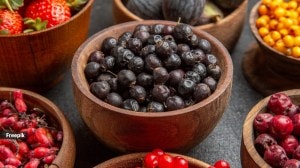Spices,herbs for a healthier heart
It is not surprising that spices were some of the most valuable trade items in ancient and medieval times.
It is not surprising that spices were some of the most valuable trade items in the ancient and medieval times. Used in traditional medicine by herbalists,they have been part of healing remedies for centuries. Modern medicine too has begun to study the powers of herbs and spices.
Here are some of the spices found to be useful for the heart:
Coriander Seeds are rich in two main compounds: Linaloon and decanoic acid. It has a long history in traditional medicine,with cholesterol-lowering and blood sugar-lowering effects. Several studies on animals have demonstrated a reduction in total cholesterol,bad cholesterol (LDL) and an increase in good cholesterol (HDL). Coriander seed powder is an essential ingredient in Indian cuisine,but for therapeutic benefits,a teaspoon or two of coriander seeds soaked overnight and consumed in the morning is helpful for people with heart disease and diabetes.
Turmeric or haldi,often referred to as Indian gold,is known for its medicinal properties in Siddha and Ayurveda. The benefits for heart health arise from curcumin,an active principle which has anti-oxidant,anti-clotting,anti-inflammatory and anti-proliferative properties. Studies have documented effects of curcumin in decreasing blood cholesterol levels. Its anti-oxidant properties may also help prevent cardiovascular complications among diabetics.
Black pepper contains piperine,which has numerous reported physiological and drug-like actions. Studies provide evidence that black pepper has cholesterol lowering properties and may help in cardiac function recovery after heart attacks. A word of caution; piperine can strengthen or modify the effects of other medicines,particularly blood-thinning agents.
Cinnamons circulatory-stimulant effects have been reported in several books. It helps in reduction of total and bad cholesterol and increase in good cholesterol. It also helps improve insulin resistance,thereby making it useful in diabetes management. While cinnamon is integral to the spice box,added benefit can be obtained by making a decoction and drinking it like tea.
Fenugreek seeds or methi have been used to prepare extracts and powders for medicinal uses,and have been described in Greek,Latin and Ayurvedic literature. Fenugreek seed powder has been known to lower levels of serum lipids such as total cholesterol and triglycerides. Anti-diabetic and cholesterol-lowering properties are also attributed to their dietary fiber constituent. They can be mixed into chapattis,rice,daal,etc.
Black cumin seeds,also known as kalonji or black caraway,should not be confused with the herb cumin. Black cumin seeds were found to have a significant impact in lowering total and bad cholesterol. Presence of phytosterols further strengthens its benefits.
Ginger has been traditionally used in Chinese,Ayurvedic and Yunani medicines. It is well known for its use for sore throats,cramps,pains,arthritis,indigestion,vomiting,and high blood pressure. The bioactive compounds in ginger include gingerol and several other phenolic compounds. Gingerol is believed to relax blood vessels,stimulate blood flow and relieve pain. Ginger is also a powerful anti-inflammatory agent,which makes it helpful for patients of heart disease,diabetes and cancer. It also has exhibited cholesterol lowering and anti-clotting activities.
Garlic: Hippocrates,the Father of Modern Medicine and the first Indian physician Charak 3000 BC,the Father of Ayurvedic medicine,claimed that garlic acts as a heart tonic by maintaining the fluidity of blood and strengthening the heart. Over centuries,Garlic has acquired a unique position in therapeutic medicine and is associated with lower risk of cardiovascular disease. Over the last 20 years,modern scientific research continues to confirm these findings around the world. Allcin,a sulfur-containing compound,is one of the key components of garlic. Allicin is known for its cholesterol lowering,anti-clotting and blood pressure lowering properties.
To summarise,spices not only provide aromatic taste components to food,but also have diverse health benefits. Evidence-based modern medicine is substantiating health claims related to foods for a healthy heart. With time,we should expect to see more scientific evidence supporting these claims.
Ishi Khosla is a former senior nutritionist at Escorts. She heads the Centre of Dietary Counselling and also runs a health food store. She feels that for complete well-being,one should integrate physical,mental and spiritual health. According to her: To be healthy should be the ultimate goal for all.



- 01
- 02
- 03
- 04
- 05




























